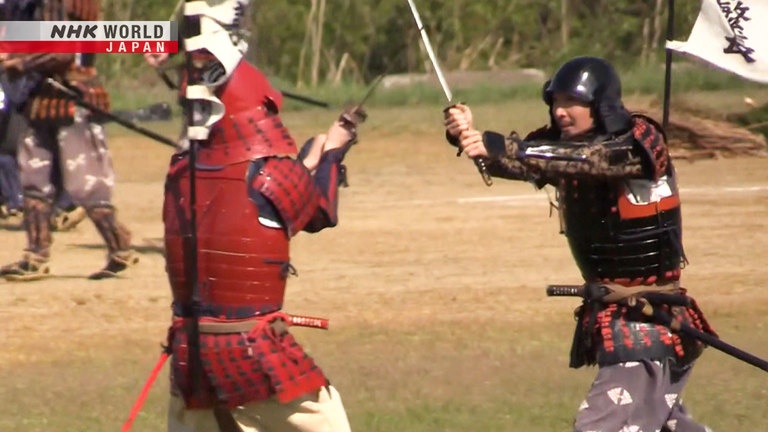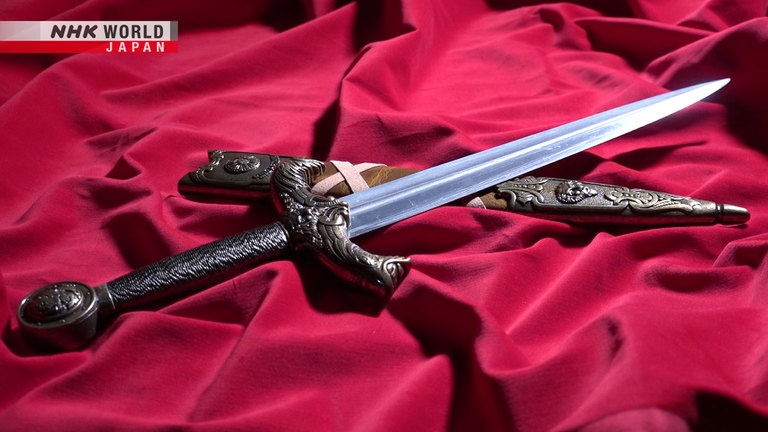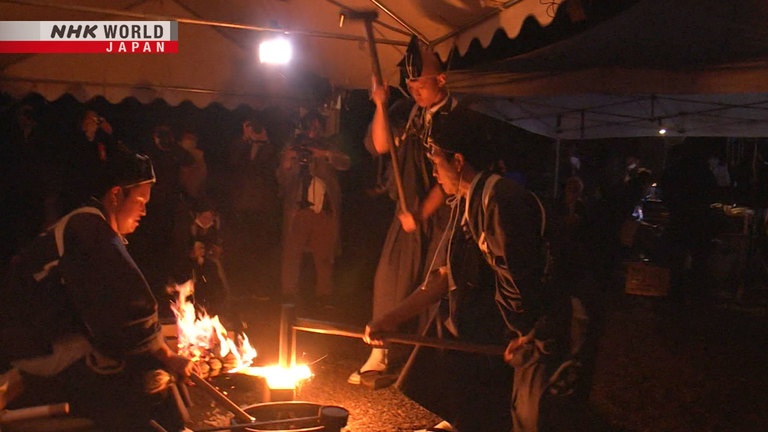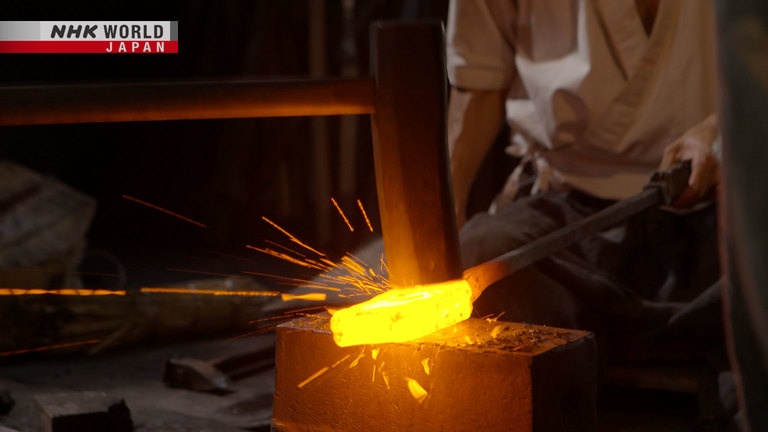Sword
The Japanese language is rich in words and expressions influenced by nature, history and culture. This episode looks at words related to swords. Since ancient times, the evolution of Japanese swords has followed a unique path. During the rule of the samurai, or bushi, swords were a part of daily life, and this resulted in many Japanese expressions related to swords. From his home in Kyoto Prefecture, poet and literary translator Peter MacMillan guides us through these words.




Transcript
Yukigesho.
Karakurenai.
The Japanese language is rich in unique expressions that reflect nature and culture.
Magical Japanese.
Today's theme is "katana," or sword.
Since ancient times, the evolution of Japanese swords has followed a unique path.
They are exceptional weapons, crafted in pursuit of the ultimate cutting edge, and also works of art.
Even now, they are sought after by collectors around the globe.
Hello, I'm Peter MacMillan.
In the age of the samurai, the sword, or "katana," was considered his soul.
The rule of the samurai, or "bushi," lasted for several centuries until the mid-19th century.
During that time "katana" were a part of daily life, and thanks to this, there are many expressions in Japanese related to the word.
tachiuchi dekinai.
"Tachi" is a large "katana."
The word comes from "tatsu," meaning "to cut."
"Uchi" means to attack.
"Tachiuchi dekinai" literally means "cannot fight."
It is used widely to describe how a person or entity is too strong or powerful to compete with.
For example: "He's always at the top of the class."
- He was born smart. "Tachiuchi dekinai."
I could never beat him.
- You should at least try!
tachiuchi dekinai.
sukedachi.
"Suke" means to help, and "dachi" is another way to pronounce "tachi," or large "katana."
Sukedachi" originally meant rushing to the scene of a battle with a "tachi" to assist.
Today it refers to helping someone. For example: "I'm not sure I can prepare in time for the presentation tomorrow."
"Do you need help?"
Thanks, but I'll go without "sukedachi"—helping hands.
I want to see my own idea through.
sukedachi.
What do you picture when you think of a Japanese "katana?"
Japanese swords were originally straight—the same shape as Western swords.
Long, curved swords, or "tachi," didn't exist until the Heian period.
Curved swords were better for slashing your enemy while riding a horse, and they became popular in Japan.
This kind of posture was possible because the swords only had a single edge, which is better for slashing than stabbing.
This brings to mind the following expression.
moroha no tsurugi.
"Moro" means "both," and "ha" means "blade.
"Moroha no tsurugi" is a double-edged sword.
The phrase is used widely in daily conversation to describe something that has both a positive and negative side.
"Thanks to my medication, I'm feeling great."
"I'm so happy for you. But it has strong side effects too.
It's a "moroha no tsurugi"—double-edged sword."
moroha no tsurugi.
sori ga awanai.
"Sori" refers to a curvature.
"Awanai" means "does not match."
"Katana" are kept in cases called "saya," specially made to match the curvature of each "katana."
"Sori ga awanai" means the shape of the "katana" and "saya" do not match, so the "katana" does not fit.
From this, the phrase is used to describe people who do not get along with each other.
"You're always arguing with him, aren't you?"
We just "sori ga awanai"—can't get along with each other.
sori ga awanai.
moto no saya ni osamaru.
"Moto" means "original," and "osamaru" means "to settle."
The expression means a "katana" is settled back into its "saya," or case, after use.
It's now used when friends, or a couple that broke up, are back together again.
For example: "I heard they split up after a huge fight, but are going out again."
"Moto no saya ni osamaru"—getting back together. Let's hope it works out.
moto no saya ni osamaru.
Western swords are cast by pouring melted iron into a mold, but Japanese swords are forged by hand.
The swordsmith hammers hot steel, making it even harder.
The steel must be hammered while it is still hot, so this process is usually done by two or three people at once.
There are some expressions that come from this kind of sword-making.
aizuchi o utsu.
"Ai" describes a sense of cooperation and reciprocity, and "zuchi" comes from "tsuchi," or hammer.
"Utsu" means "to hit."
"Aizuchi o utsu" describes an apprentice tempering a "katana" with a hammer, in time with the sound of the master's hammer.
From this, the phrase now means to listen attentively as someone speaks, for example by nodding or using facial expressions, to show surprise or interest.
aizuchi o utsu.
tonchinkan.
"Ton," "chin," and "kan" are all onomatopoeia describing the sound of the swordsmith's hammer.
Several swordsmiths work together on a single "katana."
When their movements are out of sync, the sounds they make aren't in harmony either, making different sounds such as "ton," "chin," and "kan."
From this, the word "tonchinkan" was born to describe how something is mixed up or off the mark.
"I asked him for an orange juice, and brought me a cup of coffee."
He's a bit "tonchinkan"—off the mark—but he's still a great guy.
tonchinkan.
Interestingly, "katana" also play a big part in Japanese cuisine, in the form of knives.
In the Edo period, when the civil war finally ended and Japan became peaceful, the demand for swords decreased, and sword-makers began to make kitchen knives.
They came up with various knives suited to different ways of preparing food, such as knives meant for dressing fish, and knives for cutting sashimi.
The quality of sashimi is highly dependent on the knife that is used to cut it.
Japanese cuisine owes a lot to the swordsmiths of the past.
Here is an expression born from the act of preparing fish with a knife.
manaita no koi.
This literally means a carp, or "koi," atop a "manaita," or cutting board.
When cooking a lively carp, a chef first knocks it out by striking it with the back of a cooking knife.
From this, the phrase refers to someone whose fate is completely in the hands of others.
"Are you worried about your dental surgery tomorrow?"
"All I can do now is trust the dentist."
You could say I'm a "manaita no koi"—my fate is in his hands.
manaita no koi.
Maybe I'll have sashimi for dinner tonight!
See you next time! Bye!